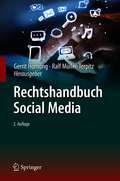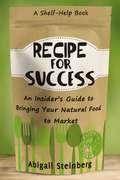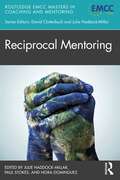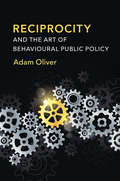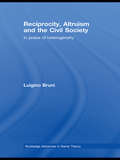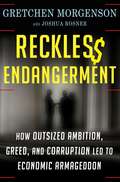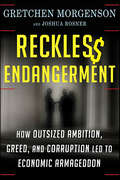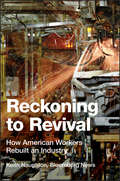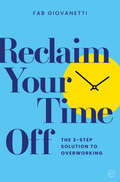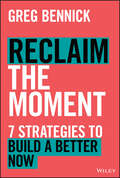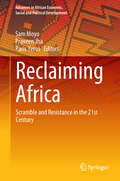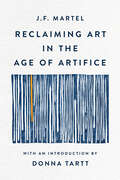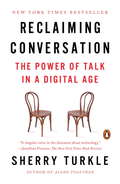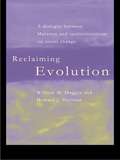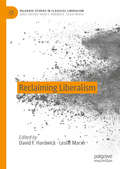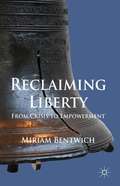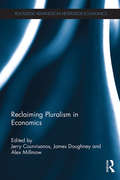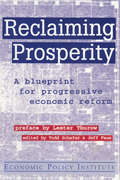- Table View
- List View
Rechtliche Rahmenbedingungen der Energiespeicher und der Sektorkopplung: EnWG mit Strommarktgesetz, EEG 2017 und KWKG 2016 (essentials)
by Henning ThomasDieses essential beschreibt die energiewirtschaftsrechtlichen Rahmenbedingungen, unter denen Energiespeicher heute im Zusammenspiel mit anderen Flexibilit#65533;tsoptionen agieren k#65533;nnen. Da Speicher als Letztverbraucher behandelt werden, k#65533;nnen Abgaben, Entgelte und Umlagen beim Strombezug eines Speichers grunds#65533;tzlich anfallen. Von gro#65533;er praktischer Relevanz sind daher mehrere Befreiungstatbest#65533;nde von Abgaben, Entgelten und Umlagen, die in diesem Buch vorgestellt werden. Zudem werden die rechtlichen Rahmenbedingungen f#65533;r die Teilnahme an unterschiedlichen M#65533;rkten dargestellt, die f#65533;r Speicher in Betracht kommen. Das Buch gibt au#65533;erdem einen vertieften Einblick in die regulatorische Entwicklung.
Rechtsformen und Rechtsformwahl: Recht, Steuern, Beratung
by Steffen Huber Axel RinnertNeue Rechtsformen und ständige Reformen im Steuerrecht führen zu einem erhöhten Beratungsbedarf, denn oft ist die gewählte Rechtsform nicht mehr steueroptimal und bedarf der Anpassung an aktuelle Entwicklungen. Das Werk stellt die Rechtsformen in einem direkten Vergleich gegenüber und nennt Vor- und Nachteile in Recht und Steuern. Alle wichtigen Informationen zur optimalen Rechtsform in einem Werk.
Rechtshandbuch Social Media
by Gerrit Hornung Ralf Müller-TerpitzSeit der Entwicklung des Internets zum Web 2.0 sind Social Media aus unserem privaten und beruflichen Alltag nicht mehr wegzudenken. Dienste wie Facebook, Instagram, YouTube, Twitter, WhatsApp, berufliche Netzwerke oder Plattformen für Bewertungen und Blogs haben erhebliche praktische Bedeutung erlangt und werfen zahlreiche, oft ungeklärte oder im Fluss befindliche Rechtsfragen auf. Seit dem Erscheinen der 1. Auflage dieses Handbuchs im Jahre 2015 hat sich zudem der Gesetzgeber dem Phänomen Social Media verstärkt angenommen. Die nunmehr aktualisierte und erweiterte 2. Auflage geht mit wissenschaftlichem Anspruch bei gleichzeitiger Praxisorientierung systematisch auf Rechtsfragen ein, die mit der Nutzung sozialer Netzwerke zusammenhängen. In Gestalt der klassischen Rechtsgebiete des Schuldrechts, Strafrechts, Arbeitsrechts und des Persönlichkeitsschutzes, der neueren Rechtsbereiche des Datenschutzes und E-Governments bis hin zum spezifischen Medien- und Internetrecht sowie unter Einschluss der Kommunikationswissenschaften wird das Phänomen Social Media ganzheitlich erfasst. Abgerundet werden diese Betrachtungen nunmehr durch Beiträge zu den ökonomischen Grundlagen sowie zum wettbewerbsrechtlichen Rahmen der sozialen Medien.
Rechtssicher in der Kinder- und Jugendarbeit: Aufsichtspflicht, Haftung, Datenschutz und alles rechtlich Relevante
by Christian JasperDieses Sachbuch erklärt anschaulich und ausführlich rechtliche Probleme, die sich bei der Vorbereitung und Durchführung von Klassenfahrten, Ferienlagern, Gruppenstunden oder sportlichen Trainingseinheiten für Kinder und Jugendliche ergeben. Der Autor greift Situationen aus der Praxis auf und zitiert gesetzliche Paragraphen nur ergänzend. Zahlreiche Beispiele sorgen dafür, dass das Buch für Nicht-Juristen gut verständlich ist. Formulierungsvorschläge für Einverständniserklärungen oder Anmeldeformulare im Anhang helfen bei der praktischen Arbeit. Ein umfangreiches Stichwortverzeichnis macht das Buch auch für eilige Leser zum unverzichtbaren Begleiter.
Recipe for America
by Jill Richardson"Jill Richardson is a fresh voice in the movement to create a healthier and sustainable food system. This book will be part of the burgeoning food social movement, as it provides a guide to the most important issues and how to work on them."--Marion Nestle"Jill's work at Daily Kos represents the best of the people-powered movement. It's a pleasure to see her work reach a new plateau and come to the attention of a wider audience."--Markos MoulitsasAmerica's food system is dominated by agribusiness and corporate farms, whose destructive practices pollute the environment, are cruel to animals, and offer us unhealthy food choices. Despite this dire situation, most people have little idea how to eat differently, or healthier.In Recipe for America, food activist Jill Richardson shows how sustainable agriculture--where local farms raise food that is healthy for consumers and animals and does not damage the environment--offers the only solution to America's food crisis. In addition to highlighting the harmful conditions at factory farms, this timely and necessary book details the rising grassroots food movement, which is creating an agricultural system that allows people to eat sustainably, locally, and seasonally.A call to action for those who are concerned about what they eat and the health of the planet, Recipe for America shows how sustainable eating nourishes our bodies, our economy, and our environment, and how it is the best hope for the future of food in America.Jill Richardson blogs about food issues at Daily Kos and at her own blog, La Vida Locavore (http://www.lavidalocavore.org). She is also a member of the advisory board of the Organic Consumers Association.
Recipe for Success: An Insider's Guide to Bringing Your Natural Food to Market
by Abigail SteinbergToday's global knowledge economy requires individuals and companies alike to quickly adapt to new tools and strategies. To remain competitive, both must continually upgrade their skills. In the United States, however, support for ongoing education lags far behind other developed nations, creating a crippling skills gap.How did we get to this point, and why are other countries faring markedly better? What keeps our nation's vast network of corporate training, workforce development, and K-12 and college education so fragmented and inefficient? Gathering insights from key thought leaders and exemplary programs, Learning for Life examines:Why America's existing educational models are failing employees and employersThe shift from content knowledge toward new ways of thinking and working, grounded in creativity, critical thinking, communication, and collaborationPolicies and programs that are working in the U.S. and abroadRecommendations for overhauling our education and training infrastructure and building partnerships between providers and employersIn a constantly changing world, the stakes are high to ensure our workforce performs. Learning for Life points to the most promising pathways for getting there.
Reciprocal Mentoring (Routledge EMCC Global Masters in Coaching and Mentoring)
by Julie Haddock-MillarReciprocal mentoring represents an approach to mentoring in organisations that is both timely and of critical importance in the context of diversity, inclusion, equity, and the power shift in mentoring practice. This book provides insight into how reciprocal mentoring programmes can strengthen mutual learning and encourage true partnership between participants. This approach to mentoring places participants on a level playing field; people with disparate expertise, backgrounds, and experience levels are placed in relationships in which they act as both mentor and mentee, generating a range of benefits for all involved. This book explores the design, development, and evaluation of reciprocal mentoring programmes in six different contexts: entrepreneurial, healthcare sector, third sector, education sector, membership organisations, and private sector organisations. Three different approaches to reciprocal mentoring programmes are set out: reciprocal by design, reciprocal by default, and reciprocal as an output. Each chapter describes a number of different case studies which adopt a variety of approaches to reciprocal mentoring programmes, their contextual relevance, and overall impact and contribution. This book will be useful for any individuals and teams involved in the development of mentoring programmes. The range of approaches and frameworks presented in this book will benefit mentoring and coaching practitioners, managers, consultants, professionals in a variety of organisational contexts, and researchers.
Reciprocity and the Art of Behavioural Public Policy
by Adam OliverWhat motivates human behaviour? Drawing on literatures from anthropology to zoology, Oliver examines how we are motivated to give and take, rather than give or take. This book reviews the evolution of reciprocity as a motivator of behaviour, in terms of its observation in non-human species, in very young humans, and in societies that we can reasonably expect are similar to those in which our distant ancestors lived. The behavioural economic and social psychology literature that aims to discern when and in what circumstances reciprocity is likely to be observed and sustained is also reviewed, followed by a discussion on whether reciprocity is relevant to both the economic and the social domains. The dark sides of reciprocity are considered, before turning again to the light, and how the potentially beneficial effects of reciprocity might best be realised. This culminates in the presentation of a new political economy of behavioural public policy, with reciprocity playing a prominent role.
Reciprocity, Altruism and the Civil Society: In praise of heterogeneity
by Luigino BruniThe main emphasis of this new book from Luigino Bruni is a praise of heterogeneity, arguing that society works when different people are able to cooperate in many different ways. The author engages in a novel approach to reciprocity looking at its different forms in society, from cautious or contractual interactions, to the reciprocity of friendshi
Reckitt Benckiser: Fast and Focused Innovation
by Rebecca Henderson Ryan JohnsonSince its 1999 merger Reckitt Benckiser (RB), a global consumer goods company, led by its CEO Bart Becht, RB developed a reputation for rapid product innovation and industry leading profit margins. RB's stated strategy was to focus on its Powerbrands and high growth categories and to nurture the Powerbrands with innovation and roll them out globally. The Powerbrands had steady double digit growth year over year, attracted a devoted customer base and typically grabbed high margins. This case examines the Powerbrands strategy, RB's devotion to fast and focused innovation and its execution of that strategy.
Reckitt Benckiser: Fast and Focused Innovation
by Ryan Johnson Rebecca M. HendersonSince its 1999 merger Reckitt Benckiser (RB), a global consumer goods company, led by its CEO Bart Becht, RB developed a reputation for rapid product innovation and industry leading profit margins. RB's stated strategy was to focus on its Powerbrands and high growth categories and to nurture the Powerbrands with innovation and roll them out globally. The Powerbrands had steady double digit growth year over year, attracted a devoted customer base and typically grabbed high margins. This case examines the Powerbrands strategy, RB's devotion to fast and focused innovation and its execution of that strategy.
Reckless Disregard: Corporate Greed, Government Indifference and The Kentucky School Bus Crash
by James S. KunenA books that covers the historic 1988 Kentucky school bus crash as James follows up with the murder trial of the bus driver and the two lieutenants who were suing the motor company, Ford Motors, to get an improved and safe school bus chasis.
Reckless Endangerment: How Outsized Ambition, Greed, and Corruption Led to Economic Armageddon
by Gretchen Morgenson Joshua RosnerMorgenson, the New York Times's Pulitzer Prize-winning columnist, and Rosner reveal how the financial meltdown emerged from the toxic interplay of Washington, Wall Street, and corrupt mortgage lenders.
Reckless Endangerment: How Outsized Ambition, Greed, and Corruption Led to Economic Armageddon
by Gretchen Morgenson Joshua RosnerA Washington Post Notable Nonfiction Book for 2011One of The Economist's 2011 Books of the Year TheNew York Times's Pulitzer Prize-winning columnist reveals how the financial meltdown emerged from the toxic interplay of Washington, Wall Street, and corrupt mortgage lendersIn Reckless Endangerment, Gretchen Morgenson, the star business columnist of The New York Times, exposes how the watchdogs who were supposed to protect the country from financial harm were actually complicit in the actions that finally blew up the American economy. Drawing on previously untapped sources and building on original research from coauthor Joshua Rosner—who himself raised early warnings with the public and investors, and kept detailed records—Morgenson connects the dots that led to this fiasco. Morgenson and Rosner draw back the curtain on Fannie Mae, the mortgage-finance giant that grew, with the support of the Clinton administration, through the 1990s, becoming a major opponent of government oversight even as it was benefiting from public subsidies. They expose the role played not only by Fannie Mae executives but also by enablers at Countrywide Financial, Goldman Sachs, the Federal Reserve, HUD, Congress, the FDIC, and the biggest players on Wall Street, to show how greed, aggression, and fear led countless officials to ignore warning signs of an imminent disaster. Character-rich and definitive in its analysis, this is the one account of the financial crisis you must read.
Reckoning to Revival: How American Workers Rebuilt an Industry
by Keith NaughtonA special report on the resurgence of the Detroit auto industry using the Chrysler Jeep plant at Jefferson North as a focal point. The report centers on the characters behind the plant and the new technology it is using for manufacturing cars, while also looking at the economic desperation of the neighborhood in which the Jeep plant sits.
Reclaim Your Time Off: The 3-step Solution to Overworking
by Fab GiovanettiA practical toolkit for thriving in the modern working environment, by a popular wellness entrepreneur and business coach.Multi-hyphen careers and remote working have now become the norm in working culture. Does "flexible working" mean "always working"? What does work-life balance actually look like? This book offers practical steps to managing remote and flexible work coexisting in the same space as life. Reclaim Your Time Off offers: • Fab's unique 3-step solution: Simplify, Delegate, Automate. • Regular "Action Steps" and coaching activities to help you see and understand current patterns and reasons for overwhelm, and turn them around. • Practical strategies to learn how to rest and work smarter.In the current working landscape, we work really hard. On average, over 60 hours per week. "Burnout" is a ubiquitous buzzword. Being overly busy is a badge of honour. This book uncovers how "busyness" can impact negatively on creativity. We need to relearn the art of being bored. Down time is an essential part of productivityand a vital component in good health and wellbeing. This book shows us how to protect it.
Reclaim the Moment: Seven Strategies to Build a Better Now
by Greg BennickAn inspiring new exploration of how to maximize your life, your work, and your productivity In Reclaim the Moment: Seven Strategies to Build A Better Now, internationally recognized speaker and author Greg Bennick delivers a practical and inspiring take on improving focus and enhancing peak performance for individuals and teams. The approach is fun and energetic, offering fresh ideas for generating authentic motivation. In the book, you'll find hands-on advice on how to revitalize and energize both yourself and your team using the author's unique combination of seven time-tested, and thoroughly researched, principles. From the alluring idea to “Keep Your Eyes on the Knife” as a reminder about the importance of focus, to a call to “Leap Into the Dark” as a guide to explore creative leadership and explore new ideas, to an invitation on “Start a Reverberation Effect™” as a means of amplifying your vision, the book offers solid approaches for peak performance. You'll discover how to strengthen teams, lead with direction, and to escape pessimism and self-doubt as you and the people around you learn to Build a Better Now. You'll also find: Personal and true stories drawn from the author's remarkable life and career Evidence-backed insights taken from contemporary sociology, cultural anthropology, and futurist literature Strategies to encourage the taking of joyful risks and increasing the amount of laughter and happiness in your life and the lives of the people you encounter Perfect for executives, managers, directors, and other business leaders, Reclaim The Moment is also a must-read resource for anyone seeking to build genuine inspiration, productivity, and connection in themselves and in the teams they work with.
Reclaiming Africa: Scramble and Resistance in the 21st Century (Advances in African Economic, Social and Political Development)
by Sam Moyo Praveen Jha Paris YerosThis book presents the findings of research conducted by scholars and activists associated with the Agrarian South Network, based mainly in Africa, Asia and Latina America. The research articulates a Southern perspective on the “new scramble” for Africa, with a view to strengthen tri-continental solidarities. The book explains the significance of the new scramble in terms of the economic structures inherited from the late-nineteenth-century scramble and the subsequent post-independence period. The renewed competition for Africa’s land and natural resources and the resumption of economic growth at the turn of the millennium have revived concerns regarding the continent’s position in the world economy and the prospects for its development in the twenty-first century. In this regard, the book addresses two related issues: the character of the expansion of Southern competitors in relation to the more established Western strategies; and the impact of the renewed influx of investments in land, minerals, and associated infrastructure. The findings are presented with empirical rigor and conceptual clarity, to enable the reader to grasp what really is at stake in the twenty-first century – an epic struggle to reclaim Africa from the monopolies that exercise control over its land, minerals, labour, and destiny.
Reclaiming Art in the Age of Artifice
by J.F. MartelA compelling call to rediscover the transformative power of art in an age of distraction, coercion, and spectacle – featuring an introduction from Pulitzer Prize–winning author Donna Tartt In Reclaiming Art in the Age of Artifice, J. F. Martel offers a compelling and incisive meditation on the nature of art in a world dominated by invasive media, rampant consumer culture, and artificial intelligence. Drawing on a wide range of examples, from Paleolithic cave art to contemporary cinema, Martel argues that true art reveals the unseen forces shaping our existence—forces that transcend politics, technology, and even culture. In contrast to artifice, which seeks to manipulate or distract, authentic art calls us back to the essence of things, opening &“rifts&” onto the sublime and the weird and reconnecting us with the radical mystery at the heart of the world. Featuring an introduction by Pulitzer Prize–winning author Donna Tartt, this edition also includes a new afterword by the author, reflecting on the continued relevance of art in our increasingly mediated world.
Reclaiming Conversation: The Power of Talk in a Digital Age
by Sherry TurkleRenowned media scholar Sherry Turkle investigates how a flight from conversation undermines our relationships, creativity, and productivity--and why reclaiming face-to-face conversation can help us regain lost ground.We live in a technological universe in which we are always communicating. And yet we have sacrificed conversation for mere connection. Preeminent author and researcher Sherry Turkle has been studying digital culture for over thirty years. Long an enthusiast for its possibilities, here she investigates a troubling consequence: at work, at home, in politics, and in love, we find ways around conversation, tempted by the possibilities of a text or an email in which we don't have to look, listen, or reveal ourselves. We develop a taste for what mere connection offers. The dinner table falls silent as children compete with phones for their parents' attention. Friends learn strategies to keep conversations going when only a few people are looking up from their phones. At work, we retreat to our screens although it is conversation at the water cooler that increases not only productivity but commitment to work. Online, we only want to share opinions that our followers will agree with - a politics that shies away from the real conflicts and solutions of the public square. The case for conversation begins with the necessary conversations of solitude and self-reflection. They are endangered: these days, always connected, we see loneliness as a problem that technology should solve. Afraid of being alone, we rely on other people to give us a sense of ourselves, and our capacity for empathy and relationship suffers. We see the costs of the flight from conversation everywhere: conversation is the cornerstone for democracy and in business it is good for the bottom line. In the private sphere, it builds empathy, friendship, love, learning, and productivity. But there is good news: we are resilient. Conversation cures. Based on five years of research and interviews in homes, schools, and the workplace, Turkle argues that we have come to a better understanding of where our technology can and cannot take us and that the time is right to reclaim conversation. The most human--and humanizing--thing that we do. The virtues of person-to-person conversation are timeless, and our most basic technology, talk, responds to our modern challenges. We have everything we need to start, we have each other.
Reclaiming Evolution: A Dialogue Between Marxism And Institutionalism On Social Change
by William Dugger Howard J. ShermanHoward Sherman and William M. Dugger engage in a dialogue on social evolution from Institutionalist and Marxist perspectives, each representing one side. Together they explore the way society develops using the equally radical, but very different approaches of Thorstein Veblen and Karl Marx.
Reclaiming Liberalism (Palgrave Studies in Classical Liberalism)
by Leslie Marsh David F. Hardwick“David Hardwick and Leslie Marsh have assembled a contentious collection of independent thinkers on liberalism’s identity and prospects. Should liberalism be democratic, classical, ordo, legalistic, culture-based, market-based, or what? The international crew of authors—from Australia, Canada, China and the USA—draw upon the insights of key historic figures from Locke to Montesquieu to Burke to Dewey to Hayek to Rawls (and of course others, given liberalism’s rich history), and they leave us with a set of liberalisms both in collision and in overlapping agreement. This book is stimulating reading for those engaged with next-generation liberal thought.”—Stephen R. C. Hicks, Professor of Philosophy at Rockford University.This collection redresses the conceptual hubris and illiteracy that has come to obscure the central presuppositions of classical liberalism - that is, the wresting of epistemic independence from overwhelming concentrations of power, monopolies and capricious zealotries, whether they be statist, religious or corporate in character.
Reclaiming Liberty
by Miriam BentwichBased on a reconstruction of earlier liberal conceptions of liberty (the political theories of John Locke & J. S. Mill), this book stresses the empowering nature of liberal freedom and explains why such a concept of liberty better addresses two key contemporary challenges in liberal theory and praxis: wealth redistribution and multiculturalism.
Reclaiming Pluralism in Economics (Routledge Advances in Heterodox Economics)
by Jerry Courvisanos James Doughney Alex MillmowUntil the end of the early 1970s, from a history of economic thought perspective, the mainstream in economics was pluralist, but once neoclassical economics became totally dominant it claimed the mainstream as its own. Since then, alternative views and schools of economics increasingly became minorities in the discipline and were considered ‘heterodox’. This book is in honour of John Edward King who has an impressive publication record in the area of economic theory with specific interest in how economic thought in the past shapes current economic theory and enforces certain paths of economic policy and economic development. This book is divided into five themes based on King’s interests. The first theme looks at the challenge in trying to reclaim pluralism in economics. The second faces head-on the direct collision of mainstream economics with history of economic thought and heterodox economics. The third addresses classical economic ideas, their central influence in the past and how they can still primarily guide modern pluralist economics. The fourth examines Post Keynesian and Kaleckian economics with a view to providing a more coherent and extensive branch of heterodox economics. The final theme critiques the policy of neoliberalism that has entrenched itself in capitalist economies which have led to financial, industrial, labour, and behavioural/consumerist crises. This text aims to provide a clear path for pluralism to serve the economics discipline as its standard bearer, and to no longer be merely a heterodox challenge to the mainstream. This book is of interest to those who study history of economic thought, political economy and heterodox economics.
Reclaiming Prosperity: Blueprint for Progressive Economic Policy (Economic Policy Institute Ser.)
by Todd Schafer Jeff FauxThis work presents a predicted summary of major economic challenges facing the United States in the last years of the 20th century. Intended to shape the platforms of the major parties and the general public, it contains proposals by leading specialists aimed at resolving such challenges.


